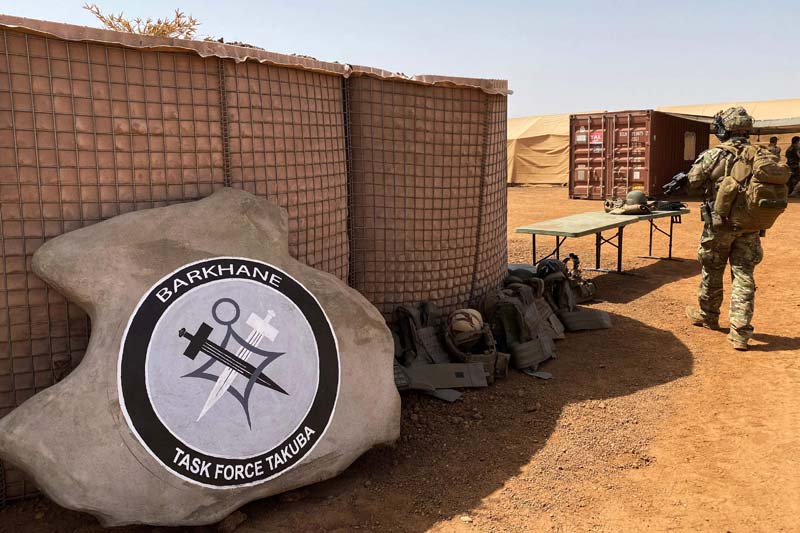 MENAKA, Mali: This file photograph shows the France-led special operations logo for the new Barkhane Task Force Takuba in Menaka.-AFP
MENAKA, Mali: This file photograph shows the France-led special operations logo for the new Barkhane Task Force Takuba in Menaka.-AFPPARIS: As well as suffering a spate of recent battlefield casualties in the Sahel, France risks losing the fight for hearts and minds in the strategic west African region. Eight years since it deployed troops against jihadists in Mali, Paris is struggling to impose itself in a separate information war being waged for public opinion.
"Fighting against terrorism implies... protecting yourself during communication and disinformation wars targeting the local populations, which can change perceptions," French Defense Minister Florence Parly said recently during a speech to special forces. Part of the problem has been highlighted by recent events on the ground.
The French "Barkhane" force-made up of 5,100 troops-came under severe scrutiny in January after an air strike in a remote and largely inaccessible region in northern Mali. More than a month later, the facts remain murky. Some locals have told journalists that up to 20 people attending a wedding in the village of Bounti were killed, while the French military insists that they targeted a gathering of jihadists.
"Once the French military becomes engaged with responding to accusations of civilian deaths and collateral damage, whether these allegations turn out to be accurate or not, it will already be perceived as a propaganda victory for the jihadists," Colin Clarke from the Soufan Center, an American think-tank, told AFP.
But in addition to anti-French messages spread by jihadist groups-which fall on fertile ground in a region once colonized by France-Paris believes Russia is also behind a disinformation campaign about its activities in the region. "The battle over Barkhane's image is more important than any actual battle in this kind of conflict," said Michael Shurkin, an analyst at the US-based security consultancy Rand. "The French government and military have been slow to engage in 'information warfare'," he added, saying that "doing 'propaganda' makes the French military nervous."
'Trolling'
It may have been slow to catch on, but there is evidence that France is now taking action. In December, Facebook said it had closed down two Russian-linked networks of fake troll accounts which sought to sway public opinion, as well as a third with "links to individuals associated with French military." The French defense ministry initially declined to comment, before saying that it could not attribute responsibility for the accounts. But Alexandre Papaemmanuel, an intelligence specialist at the IEP research center in France, believes some figures in the military were relieved to see France adopting the same tactics as its rivals.
"But to become tougher, should democracies follow the example of authoritarian regimes?" he asked. "It's a slippery slope." Part of the problem for France may be that for many people living in the region, the results of Barkhane's operations are difficult to see because the jihadists have dug in and keep launching attacks. "The results are imperceptible for an average Malian," said Denis Tull from the German Institute of International Relations (SWP). He also blames French "arrogance" for the way leaders respond to local criticism.
"Any Malian criticism is seen as ingratitude and sparks irritation," he said, adding that Paris "is in the process of losing the battle for public opinion almost everywhere in French-speaking Africa." The future of the Barkhane mission is set to be discussed at a summit in Chad on February 15-16 between the countries of the Sahel region-Burkina Faso, Chad, Mali, Mauritania and Niger-and France.
French President Emmanuel Macron is known to want to reduce France's presence by sharing the burden of military operations with the countries of the region and fellow European partners. A 13,000-strong UN force is also based in the Sahel, which suffered further casualties on Wednesday when 28 peacekeepers were wounded during an attack on their base in central Mali. - AFP










